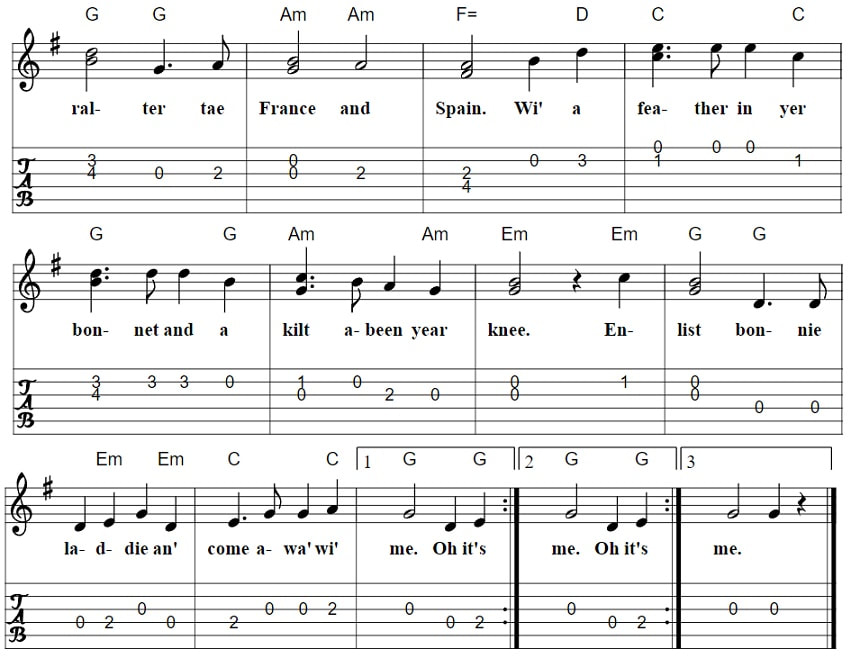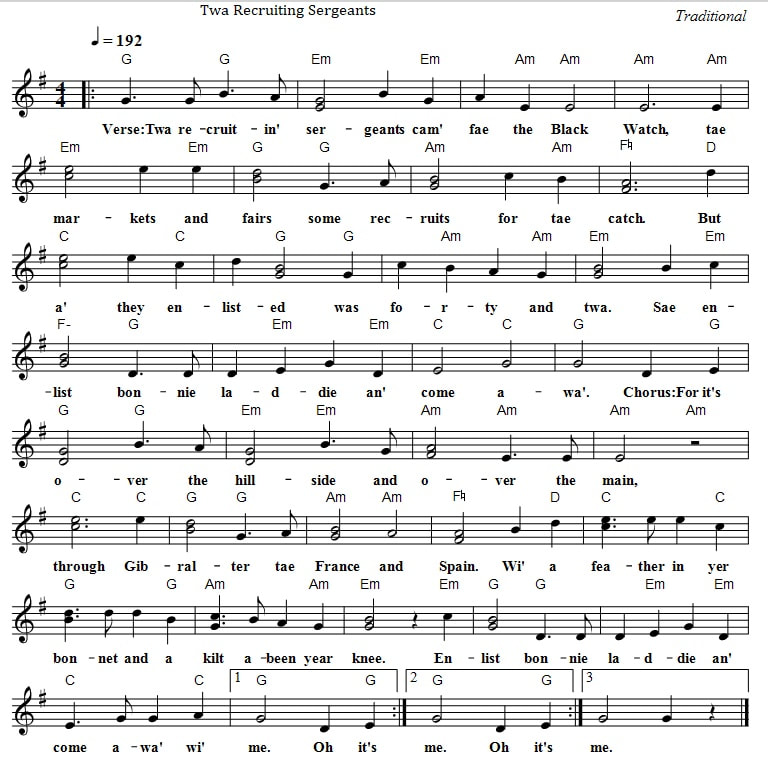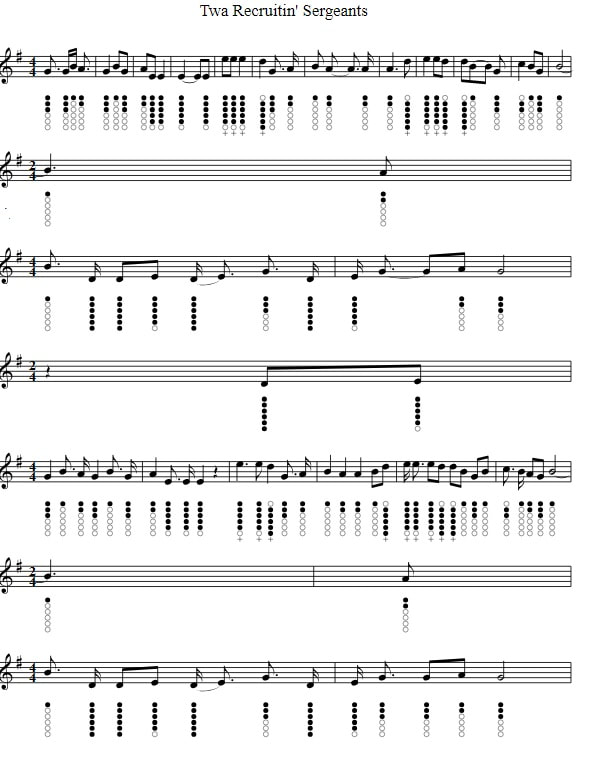TWA RECRUITIN’ SERGEANTS Lyrics And Guitar Chords
4/4 (Traditional Scottish Song) For the McCalman’s version from their album ‘Songs From Scotland’ use capo on 3rd fret, guitar work by Marc Fahrbach. Twa Recruiting Sergeants sheet music with piano chords included.
The role of Twa recruiting sergeants in British military recruitment during the 18th and 19th centuries
Introduction
The British military recruitment system during the 18th and 19th centuries was heavily reliant on the efforts of Twa recruiting sergeants. These individuals were tasked with the crucial role of recruiting men for the British Army, which was constantly in need of new soldiers for its many campaigns around the world. This thesis aims to explore the role of Twa recruiting sergeants in British military recruitment during this period, examining their methods, impact, and the controversies surrounding their activities.
Background
The British Army during the 18th and 19th centuries was the largest and most powerful in the world. It was constantly engaged in numerous conflicts, both within Europe and in its far-reaching colonies. As a result, the demand for soldiers was high, and the recruitment process was vital for the maintenance of the army. The recruitment system at this time was largely based on voluntary enlistment, and it was the responsibility of Twa recruiting sergeants to persuade men to join the army.
Who were the Twa recruiting sergeants?
Twa recruiting sergeants were individuals hired by the British Army to recruit soldiers. They were often former soldiers themselves and were well-versed in the art of persuasion. The term 'Twa' refers to their height, as they were typically short in stature. They were also known as 'crimpers' or 'body-snatchers' due to their often unscrupulous methods of recruitment.
Methods of Recruitment
Twa recruiting sergeants used various methods to entice men to join the army. One of the most common tactics was the use of 'drunken enlistment.' They would often frequent taverns and offer free drinks to young men, encouraging them to enlist while they were inebriated. This method was particularly effective as it appealed to the sense of adventure and opportunity for a better life that many young men sought.
Another method used by Twa recruiting sergeants was the promise of a signing bonus. This was a sum of money paid to the recruit upon enlistment, which was a significant amount for many impoverished men. The promise of steady pay and the opportunity for advancement within the army were also used to persuade men to join.
Impact of Twa recruiting sergeants
The impact of Twa recruiting sergeants on British military recruitment was significant. They were responsible for a large portion of the army's new recruits, and their methods were successful in attracting men from all walks of life. The British Army was able to maintain its strength and continue its expansion due in large part to the efforts of these recruiters.
Controversies surrounding Twa recruiting sergeants
The methods used by Twa recruiting sergeants were not without controversy. One of the most significant criticisms of their recruitment practices was the use of deception and coercion. Many recruits were misled about the length of their service, the conditions of their enlistment, and the potential dangers they would face. In some cases, men were even kidnapped and forced into service against their will.
There were also concerns about the quality of recruits brought in by Twa recruiting sergeants. As they were often paid based on the number of men they enlisted, there were reports of them enlisting men who were unfit for service, such as the elderly or those with physical disabilities. This led to a decline in the overall quality of the army, which had serious consequences during times of war.
Conclusion
In conclusion, Twa recruiting sergeants played a crucial role in British military recruitment during the 18th and 19th centuries. Their methods were successful in attracting a large number of men to join the army, but they were not without controversy. The use of deception and coercion, as well as the recruitment of unfit men, raised ethical concerns and damaged the reputation of the British Army. However, their contribution to maintaining the strength of the army cannot be overlooked, and their legacy remains a significant part of British military history.
Introduction
The British military recruitment system during the 18th and 19th centuries was heavily reliant on the efforts of Twa recruiting sergeants. These individuals were tasked with the crucial role of recruiting men for the British Army, which was constantly in need of new soldiers for its many campaigns around the world. This thesis aims to explore the role of Twa recruiting sergeants in British military recruitment during this period, examining their methods, impact, and the controversies surrounding their activities.
Background
The British Army during the 18th and 19th centuries was the largest and most powerful in the world. It was constantly engaged in numerous conflicts, both within Europe and in its far-reaching colonies. As a result, the demand for soldiers was high, and the recruitment process was vital for the maintenance of the army. The recruitment system at this time was largely based on voluntary enlistment, and it was the responsibility of Twa recruiting sergeants to persuade men to join the army.
Who were the Twa recruiting sergeants?
Twa recruiting sergeants were individuals hired by the British Army to recruit soldiers. They were often former soldiers themselves and were well-versed in the art of persuasion. The term 'Twa' refers to their height, as they were typically short in stature. They were also known as 'crimpers' or 'body-snatchers' due to their often unscrupulous methods of recruitment.
Methods of Recruitment
Twa recruiting sergeants used various methods to entice men to join the army. One of the most common tactics was the use of 'drunken enlistment.' They would often frequent taverns and offer free drinks to young men, encouraging them to enlist while they were inebriated. This method was particularly effective as it appealed to the sense of adventure and opportunity for a better life that many young men sought.
Another method used by Twa recruiting sergeants was the promise of a signing bonus. This was a sum of money paid to the recruit upon enlistment, which was a significant amount for many impoverished men. The promise of steady pay and the opportunity for advancement within the army were also used to persuade men to join.
Impact of Twa recruiting sergeants
The impact of Twa recruiting sergeants on British military recruitment was significant. They were responsible for a large portion of the army's new recruits, and their methods were successful in attracting men from all walks of life. The British Army was able to maintain its strength and continue its expansion due in large part to the efforts of these recruiters.
Controversies surrounding Twa recruiting sergeants
The methods used by Twa recruiting sergeants were not without controversy. One of the most significant criticisms of their recruitment practices was the use of deception and coercion. Many recruits were misled about the length of their service, the conditions of their enlistment, and the potential dangers they would face. In some cases, men were even kidnapped and forced into service against their will.
There were also concerns about the quality of recruits brought in by Twa recruiting sergeants. As they were often paid based on the number of men they enlisted, there were reports of them enlisting men who were unfit for service, such as the elderly or those with physical disabilities. This led to a decline in the overall quality of the army, which had serious consequences during times of war.
Conclusion
In conclusion, Twa recruiting sergeants played a crucial role in British military recruitment during the 18th and 19th centuries. Their methods were successful in attracting a large number of men to join the army, but they were not without controversy. The use of deception and coercion, as well as the recruitment of unfit men, raised ethical concerns and damaged the reputation of the British Army. However, their contribution to maintaining the strength of the army cannot be overlooked, and their legacy remains a significant part of British military history.
There was (D)twa recruiting (Bm)sergeants came (Em)frae the Black Watch
Tae (G)markets and (D)fairs, some re(Em)cruits for tae (A)catch.
But (G)a' that they (D)'listed was (Em)forty and (Bm)twa:
En(D)list my bonnie (Bm)laddie an' (G)come a(D)wa.
Chorus
And it's (D)over the (Bm)mountains and (Em)over the Main,
(G)Through Gi(D)bralter, to (Em)France and (A)Spain.
Pit a (G)feather tae your (D)bonnet, and a (Em)kilt aboon your (Bm)knee,
En(D)list my bonnie (Bm)laddie and (G)come awa with (D)me.
Its (D)out o’ the (Bm)barn and (Em)into the byre,
Well (G)this ole (D)farmer, he (Em)thinks ye never (A)tire.
It's a (G)slavery (D)job, of (Em)low de(Bm)gree.
Sae (D)list my bonnie (Bm)laddie and (G)come awa with (D)me
Chorus
Oh (D)laddie ye (Bm)dinna ken the (Em)danger that yer in.
If yer (G)horses was to (D)fleg, and yer (Em)owsen was to (A)rin,
This (G)greedy ole (D)farmer, he (Em)wouldna pay yer (Bm)fee.
Sae (D)list my bonnie (Bm)laddie and (G)come awa wi' (D)me
Chorus + Intro
Optional verse (not used by the McCalmans)
With (D)your tattie (Bm)porin's and yer (Em)meal and kale,
Yer (G)soor sowan' (D)soorin's and yer (Em)ill-brewed (A)ale,
Yer (G)buttermilk, yer (D)whey, and yer (Em)breid fired (Bm)raw.
Sae (D)list my bonnie (Bm)laddie and (G)come a(D)wa.
Chorus
O (D)laddie (Bm)if ye had a (Em)sweetheart an' a bairn,
Ye'll (G)easily get (D)rid o' that (Em)ill-spun (A)yarn.
Twa (G)rattles o' the (D)drum, aye and (Em)that'll pay it (Bm)a'.
Sae (D)list my bonnie (Bm)laddie and (G)come a(D)wa.
Chorus twice
Meaning of unusual words:
twa=two
awa=away
aboon=above
bonnie=handsome
fleg=take fright
owsen=oxen
rin=run
Tattie pourin's=water in which pototoes have been boiled.
kale=a kind of crinkly cabbage
Soor sooin' sourin's sowans = a dish made by steeping and fermenting the husks or siftings
of oats in water, then boiling.
whey=liquid left when milk forms into lumps.
aye=yes



